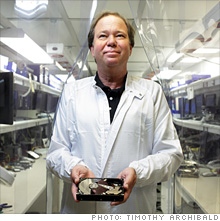The tech catastrophe you're ignoring
Backed up your hard drive lately? Here's why it still matters.
 |
| Disk Man: CEO Jay Hagan in the clean room at DriveSavers. |
(Fortune Small Business) -- Sometimes, it may shock you to learn, journalists misjudge the scale of threats.
I remember working on a Scottish newspaper in the mid-1990s, when the first minor outbreak of mad cow disease in humans, which happened in Scotland, hit the headlines. One day, an editor who wrote a lot of those headlines read a menu from the company cafeteria. "Thank goodness, they're not feeding us beef," he announced triumphantly, his health campaign won. Then, without a trace of irony: "Great. I'm just off for a cigarette."
Try as we might, we find it hard to focus on problems in plain sight. (Smoking contributes to 5 million deaths each year worldwide. To date, mad cow disease has infected slightly more than 150 humans.)
You find similar irrationality in the tech world. Massive resources are pledged to protect us from headline-grabbing threats like viruses, phishing sites or hackers that turn our computers into "zombie" machines to attack others on the Internet. And well they should be. But we're ignoring one extremely unsafe habit: not backing up our fragile hard drives.
My computers have never been hacked or seriously infected, but I've lost plenty of documents to defective drives. So have 76% of small business owners, according to an Fortune Small Business/Zogby International poll. More than half of them failed to recover any data at all.
This past summer I visited the folks at DriveSavers, a Novato, Calif., outfit that I had last checked in with five years ago. DriveSavers is a top-of-the-range data recovery service that can salvage, on average, 90% of any dead drive's files. It isn't cheap (average cost per drive: $700), yet business is booming.
Five years ago DriveSavers had 35 employees. Now there are 85. Annual revenues have held steady at $20 million, despite the recession -- and the company barely bothers to advertise. The walls of the reception room are lined with autographed photos of Sean Connery and other grateful celebrities who turned to DriveSavers after dropping or dunking their computers.
I donned a space-age suit and visited the clean room, where drive surgeons perform delicate data operations in highly filtered air. Every station was filled with bare hard drives. When naked, these devices look like tiny platinum LPs, with a reader arm that works like a needle. But instead of running smoothly in a groove, these needles were jerking about incessantly, trying to get a read. That's the awful clicking sound you hear when a drive decides to die.
I had hoped to find that the great hard-drive epidemic would end someday, that in a decade or so DriveSavers would no longer be necessary. After all, we are moving into the era of solid-state drives, better known as flash memory. Cameras and phones already carry them, along with more high-end laptops such as the MacBook Air. The whole point of flash drives is that they have no moving parts. Unlike regular drives, they aren't trying to read etchings in a cylinder that spins thousands of times a second.
But I'm sorry to report that flash drives were well represented in the DriveSavers clean room. DriveSavers CEO Jay Hagan explained that all drives die eventually, even solid-state ones. Failures usually happen when you haven't backed up recently.
We're also entering the age of cloud computing, with more and more data stored on remote servers maintained by outside companies. Server hard drives won't be solid-state any time soon; they're too large. And multiple hard drives in a single server have a tendency to fail simultaneously because they were likely all installed at the same time.
So back up your data. It may not be sexy, but it's essential now and will be for decades to come. Buy more external drives than you think you'll need. (My wife recently had three hard drives fail at once, in the middle of a backup.) If you're on a Mac, use Time Machine, the backup software that runs in the background and comes free with the OS. If you have a PC, give WinBackup ($50) or the free SyncBack a try.
Get your own house in order, and you'll be equipped to deal with whatever overhyped, headline-grabbing threat comes next. ![]()
-
The Cheesecake Factory created smaller portions to survive the downturn. Play
-
A breeder of award-winning marijuana seeds is following the money and heading to the U.S. More
-
Most small businesses die within five years, but Amish businesses have a survival rate north of 90%. More
-
The 10 most popular franchise brands over the past decade -- and their failure rates. More
-
These firms are the last left in America making iconic products now in their twilight. More









